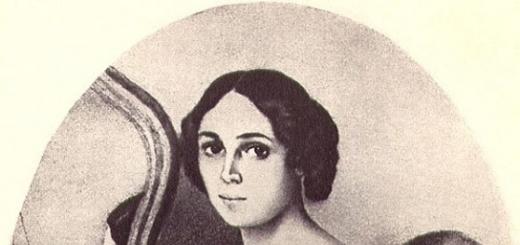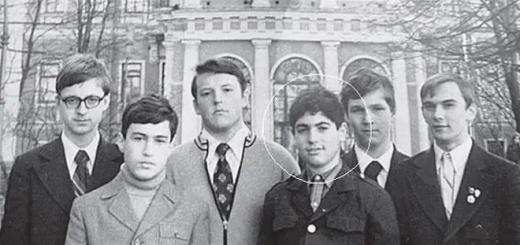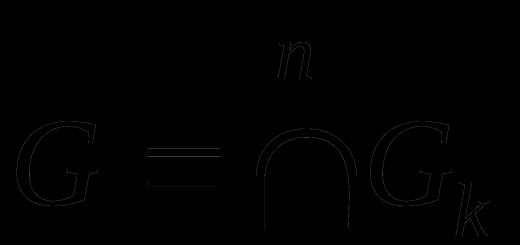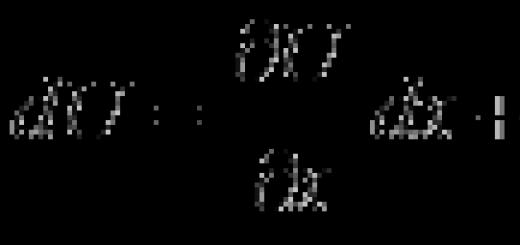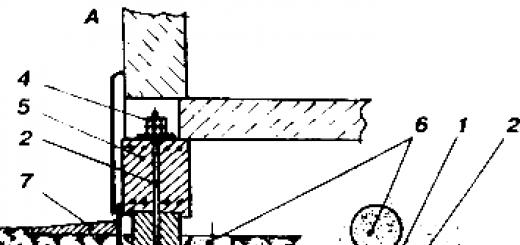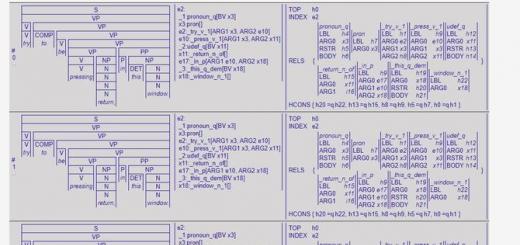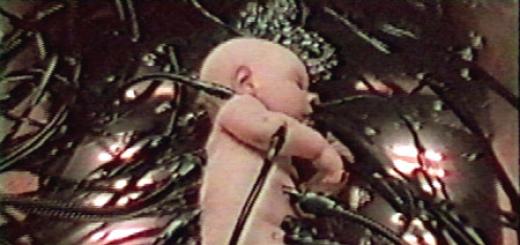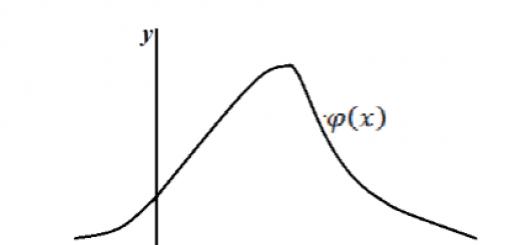On November 11, 2002, an article from St. Petersburg appeared on one of the major scientific publication portals on the Internet. mathematician Grigory Perelman, in which he gave proof of the Poincaré conjecture. Thus, the hypothesis became the first solved problem of the millennium - the so-called mathematical questions, the answers to which have not been found for many years. Eight years later, the Clay Mathematics Institute awarded the scientist a prize of one million US dollars for this achievement, but Perelman refused it, saying that he did not need the money and, moreover, did not agree with the official mathematical community. The poor mathematician's refusal of a large sum caused surprise in all layers of society. For this and for his reclusive lifestyle, Perelman is called the strangest Russian scientist. the site found out how Grigory Perelman lives and what he does today.
Mathematician No. 1
Now Grigory Perelman is 51 years old. The scientist leads a secluded life: he practically never leaves home, does not give interviews, and is not officially employed anywhere. The mathematician never had close friends, but people who know Perelman claim that he was not always like this.
“I remember Grisha as a teenager,” says Perelman’s housemate, Sergey Krasnov. - Although we live on different floors, we see each other sometimes. Previously, we could talk to his mother, Lyubov Leibovna, but now I rarely see her. She and Grigory periodically go out for a walk, but are always at home. When we see each other, they quickly nod and move on. They don't communicate with anyone. And during his school years, Grisha was no different from other boys. Of course, even then he was actively interested in science and spent a lot of time reading books, but he also found time for other things. I studied music, hung out with friends, and played sports. And then he sacrificed all his interests to mathematics. Was it worth it? Don't know".
Grigory always took first place in mathematics Olympiads, but one day victory eluded him: in the eighth grade at the All-Union Olympiad, Perelman became only second. Since then, he abandoned all his hobbies and recreation, immersing himself in books, reference books and encyclopedias. He soon caught up and became the #1 young mathematician in the country.
Reclusion
Krasnov states: none of the residents of their house doubted that Perelman would become a great scientist. “When we found out that Grisha proved the Poincaré conjecture, which no other person in the world could do, we were not even surprised,” the pensioner admits. - Of course, we were very happy for him, we decided: finally Grigory will make his way into the people, make a dizzying career! Well done, he deserves it! But he chose a different path for himself.”
Perelman refused a cash prize in the amount of a million dollars, justifying his decision by disagreement with the official mathematical community, while adding that he did not need the money.
After Perelman’s name thundered throughout the world, the mathematician was invited to the USA. In America, the scientist gave presentations, exchanged experience with foreign colleagues and explained his methods for solving mathematical problems. He quickly became bored with publicity. Returning to Russia, Perelman voluntarily left his post as a leading researcher at the laboratory of mathematical physics, resigned from the St. Petersburg branch of the Steklov Mathematical Institute of the Russian Academy of Sciences, and reduced his communication with colleagues to zero. A few years later, they wanted to make Perelman a member of the Russian Academy of Sciences, but he refused. Having stopped almost all contacts with the outside world, the scientist locked himself in his apartment in Kupchino, on the outskirts of St. Petersburg, where he lives with his mother.
“Grisha was tortured by attention”
Nowadays, mathematicians very rarely leave home and spend whole days solving new problems. “Grisha and his mother live on Lyubov Leibovna’s pension,” says Krasnov. - We, the residents of the house, in no way condemn Grisha - they say, the man is in the prime of his life, but does not bring money to the family, does not help his old mother. There is no such. He is a genius, and geniuses cannot be condemned. Once they even wanted to chip in with the whole house to help them financially. But they refused - they said that they had enough. Lyubov Leibovna always said that Grisha is unpretentious: he wears jackets or boots for decades, and for lunch, macaroni and cheese is enough for him. Well, it’s not necessary, it’s not necessary.”
According to neighbors, any person in Perelman’s place would become unsociable and closed: although the mathematician has not given rise to discussion for a long time, his person still cannot be ignored. “Some journalists are on duty at Perelman’s door 24 hours a day,” Sergei Petrovich is indignant. - Once they waited until Grisha and his mother were leaving the apartment for a walk. A huge cameraman literally dared Lyubov Leibovna to film the situation in their apartment - their apartment was not very tidy, and they decided to focus on this. And the young correspondent attacked Perelman himself with questions. They didn't go out for a long time after that. Everyone will be stressed here! Grisha was tormented with attention!”
Residents of the house are confident that Perelman will make a name for himself by making a new discovery in the field of mathematics. “His work will not be in vain,” says Krasnov. “You just need to leave him alone and let him live in peace.”
The oddities of a great man are commensurate with his genius. Therefore, when the mathematical world learned that the reclusive St. Petersburg mathematician Grigory Yakovlevich Perelman refused a million-dollar prize for proving the Poincaré conjecture, everyone understood that a new Carl Friedrich Gauss had appeared in Russia, who hid his discovery of non-Euclidean geometry in secret.
The story is like this. In 2006, Science magazine called Perelman’s proof of Poincaré’s theorem a scientific breakthrough, and a year later, the British newspaper The Daily Telegraph published a list of “One Hundred Living Geniuses,” in which Grigory Perelman ranks 9th. Besides Perelman, only 2 Russians were included in this list - Garry Kasparov and Mikhail Kalashnikov.
G. Perelman's discovery was awarded the highest mathematical award - the international Fields Medal Prize, equivalent to the Nobel Prize (as is known, there is no Nobel Prize for work in the field of mathematics). The official wording of the award was: “For his contribution to geometry and his revolutionary ideas in the study of the geometric and analytical structure of the Ricci flow”). And in March 2010, the Clay Mathematics Institute awarded Grigory Perelman a prize of one million US dollars for proving the Poincaré conjecture. This marked the first time in history that a prize had been awarded for solving one of the Millennium Problems. So: Perelman refused both Fields and the prize, citing the following reason: “I refused. You know, I had a lot of reasons in both directions. That's why it took me so long to decide. In short, the main reason is disagreement with the organized mathematical community. I don't like their decisions, I think they are unfair. I believe that the contribution of the American mathematician Hamilton to solving this problem is no less than mine.”
My task does not include either an analysis of the Poincaré problem or Perelman’s argumentation (see Appendix) - these questions are far from the understanding of the “intellectual majority”, which, if they are interested in the Perelmans, is not in their discoveries, but in their deviations from the norm. And Perelman’s deviations from the norm really overwhelmed him: an unsociable man-mystery, who voluntarily left a prestigious job, chose the lifestyle of an ascetic in a tiny apartment in a St. Petersburg Khrushchev building, for many years after Poincaré’s proven hypothesis did not work anywhere, who declared that he was done with science, did not fundamentally giving an interview and surviving from bread and water on the meager pension of his elderly mother and only once declaring: “There is nothing to live on.”
I do not claim that the homeland abandoned its hero. They say that some St. Petersburg university invited him to teach, offering the would-be millionaire a salary of $300. Perelman refused the pitiful handout, believing that it was impossible to consider science as a commodity...
However, the point is not in the assessment of work, but in moral criteria and something else hidden. Because despite all the oddities of this undeniably great man, he agreed to work in a Swedish company engaged in scientific development and guaranteed him a decent life, comfortable housing and doing what he loved.
Israeli television producer Alexander Zabrovsky, who was eager to make a feature film about Perelman and spent several years persuading the mathematician to agree to this, said that it was he who helped Grigory Yakovlevich find a job he liked and solve his financial problems:
- He was given a decent monthly salary and given housing in one of the small towns in Sweden. Now he is doing what he loves and no longer experiences financial problems. Mom went with him. Grigory Yakovlevich’s half-sister is also there. Science knows no geographical or national barriers. The main thing is that his mind benefits society and that he himself feels good and comfortable. The work is related to nanotechnology.
Perelman received a foreign passport and a visa valid for 10 years; the documents indicated the reason for the trip - “scientific activity.”
Vladimir Fok, a mathematics teacher at the University of Strasbourg, comments on the situation: “Russian scientists have two main problems - very low wages and dependence on an incompetent administration. People who have nothing to do with science like to put a spoke in the wheels, although they should help.
I myself went to Strasbourg for this reason, although I tried to stay in Russia and worked on temporary contracts. But my institute, in my opinion, ceased to exist as a scientific institution and I was forced to emigrate. Now about 80% of students go abroad. And eminent scientists are also leaving the country. To all the difficulties of a scientist there is also added public condemnation - in our country, being a man of science is the same as being a fool. While in the West such social status commands respect.”
Apparently, Grigory Yakovlevich decided to be closer to his family, to his sister, who also received a mathematical education. He took his old mother with him.
“I feel infinitely sorry for Grisha’s mother,” Sergei Rukshin, a teacher and friend of the Fields laureate, commented on the situation. “She has long needed good medicine and special care, which Grisha could not provide. I and other people who knew him closely repeatedly offered help, including financial help, but he constantly refused. He is always extremely scrupulous with money.
It is almost impossible to stop emigration from Russia. Western countries still look attractive to residents of the ravaged country. This applies both to material well-being and to the stability associated with respect for civil liberties and peace, which intellectuals crave. The loss of millions of their fellow citizens in the 20th century, and far from the worst, is a very bitter lesson for Russia.
Academician Ludwig Faddeev, director of the Mathematical Institute. V.A. Steklova, in one of the issues of the magazine “In the World of Science” (2014, No. 2) wrote: “Our institute had 110 employees, of which 70 were doctors. 40 left.” That is, more than half of the highly qualified scientists emigrated ... They didn’t just leave, they changed the face of the science of sciences - foreign mathematics...”
At the Institute of High Pressure Physics named after. Vereshchagin RAS in 1988 employed 700 people, now - 150... In my NSC KIPT - 6500, now - 2300...
The number of highly qualified specialists who left Russia has more than doubled in three years - from 20 thousand people in 2013 to 44 thousand people in 2016. The chief scientific secretary of the Presidium of the Russian Academy of Sciences, Nikolai Dolgushkin, spoke about this at the general meeting of the Russian Academy of Sciences. “The average age of a researcher exceeded 50 years, and one in three has reached retirement age,” he added. “Since 1990, the number of researchers in the country has decreased by 2.7 times, and the average annual reduction in personnel involved in research and development has been 1.3% per year since 2000,” Dolgushkin said. In the European Union and the USA, the number of scientists during this time increased by 2-3%, and in Brazil, Korea and China - from 7% to 10%.
Russian economist Leonid Grigoriev said that “two million democrats have left Russia over the past ten years,” and Alexander Shchetinin called the brain drain “a flight from the zombie-box empire.” The author of the article “The general flight of Russians from Russia” (http://besttoday.ru/read/5404.html) writes: “We have turned into a third world country in terms of infrastructure and security. We don't have proper schools, hospitals or universities. Any contact with the state requires money, nerves and papers, and more and more. Literally any part of the free living space is filled with bureaucratic instructions, just as in a locked room oxygen is replaced by carbon dioxide. And when the people who perpetrated the kirdyk on Russia explain to us what the problem is, they say: “It’s because there are enemies around.”
Number of people employed in science only from 1991 to 1999. in Russia decreased by more than half (from 878.5 thousand to 386.8 thousand people), and tens of thousands of Russian scientists moved to the United States alone. According to official statistics, up to 60% of Russians - winners of international Olympiads - go to work abroad. The most serious situation has developed in applied areas: the best specialists are leaving for foreign companies.
A few specific examples. Mikhail Leonidovich Gromov is a world-famous mathematician, Doctor of Physical and Mathematical Sciences, Abel Prize laureate. Emigrated in 1974 to the USA. The Abel Prize in mathematics is also considered the equivalent of the Nobel Prize. It was awarded to Mikhail Leonidovich Gromov for “his revolutionary contribution to geometry.”
David (Dmitry Aleksandrovich) Kazhdan is an Israeli, former Soviet and American mathematician. He emigrated from the USSR in the mid-1970s to the USA, and in 2002 he moved to Israel. David Kazhdan is a member of the US National Academy of Sciences, the American Academy of Arts and Sciences, and the Israeli Academy of Sciences. In 2012 he became a laureate of the State Prize in Mathematics and Computer Science. Professor Kazhdan made major contributions to the development of group theory, which is the cornerstone of mathematics, but its principles also extend to physics, quantum theory and computer science.
Voevodsky Vladimir Aleksandrovich is a Russian and American mathematician, one of the outstanding innovating scientists of our time in the field of algebraic geometry. In 2002, Vladimir Voevodsky became the winner of the John Fields Prize, the highest award of the International Congress of Mathematicians. After graduating from Moscow State University, he completed an internship at Harvard and immigrated to the USA. Now he is a professor at the Institute for Advanced Studies at Princeton.
Andrei Konstantinovich Geim is a famous physicist, winner of the 2010 Nobel Prize in Physics, a member of the Royal Society of London, known as one of the discoverers of graphene, a two-dimensional allotropic modification of carbon. On December 31, 2011, by decree of Queen Elizabeth II, he was awarded the title of knight for services to science with the official right to add the title “sir” to his name. The achievements of Phystech graduates Andrei Geim and Konstantin Novoselov are now proud of as their own in the UK.
Abrikosov Aleksey Alekseevich is a famous physicist, Nobel Prize laureate in physics (2003), academician of the Russian Academy of Sciences, Doctor of Physical and Mathematical Sciences. The main work was done in the field of condensed matter physics. In 1991 he moved to the USA.
Lev Petrovich Gorkov - Soviet-American physicist, academician of the USSR Academy of Sciences, academician of the Russian Academy of Sciences, Doctor of Physical and Mathematical Sciences. In 1991, Gorkov immigrated to the United States, where he worked at the University of Illinois at Urbana-Champaign and then as director of the National High Magnetic Field Laboratory in Tallahassee, Florida. In 2005, Lev Petrovich was elected a member of the US National Academy of Sciences.
Simon Smith Kuznets is an economist, statistician, demographer and economic historian. Winner of the 1971 Nobel Prize in Economics "for his empirically based interpretation of economic growth, which has led to new and deeper understanding of economic and social structure and the development process as a whole." The name of Kuznets is associated with the formation of economics as an empirical scientific discipline and the development of quantitative economic history.
Leonid Solomonovich Gurvich - economist, honorary professor at the University of Minnesota. Worked on the Coles Commission and won the 2007 Nobel Prize in Economics. Known as one of the founders of the theory of optimal mechanisms.
Professor Andrey Gudkov, Senior Vice-President of the Oncological Institute named after. Roswell Park, Buffalo, USA, author of more than a hundred scientific papers in the field of cancer treatment writes:
- You can talk about a feeling of gratitude and debt to the society that raised you and gave you knowledge. For me, such an unpaid debt is, first of all, education, which I could pass on to young people while living in Russia. But, on the other hand, I am sincerely convinced that I bring more benefit to science with my work abroad, since the technical capabilities and speeds available there make it possible to achieve incomparable results per unit of time. I'm happy where I'm working now. There are about 40 Russian-speaking families in Buffalo - we are creating a micro-society, no one is forcing us to change our culture. There is no ideology here, we are trying to work in the Russian Federation, but it is unlikely that I will return: firstly, I am many years old, and secondly, it seems to me that it is more useful to continue an existing business than to start something here again.
Today's Russia is still unable to compete for talent in the global labor market, so scientists prefer to look for work abroad, these are the conclusions of a study by the Boston Consulting Group, in which 24 thousand respondents from Russia took part. According to the results of this study: exactly half of Russian scientists seek to get a job abroad, as well as 52% of top managers, 54% of IT specialists, 49% of engineering workers and 46% of doctors. 65% of potential emigrants are “digital talent”: artificial intelligence specialists, Scrum Masters, user interface designers, etc. Moreover, 57% of them are young people under the age of 30. Among students, this share reaches 59%. “Working in Russia means swimming without water”, “Study, study and rush away” - these are the slogans of the paravalitists.
Among the reasons for leaving are: increased qualifications, a higher standard of living and expanded career opportunities. In addition, reasons often cited included economic instability in the home country and higher quality of government services abroad - in health, education and child care.
Every year, 100 thousand people leave Russia for developed countries, according to RANEPA data. This figure cited by host countries is 7 times higher than the official figure of Rosstat.
In October 2009, scientists who left Russia in the early 90s and made successful careers abroad wrote an open letter to the President and Prime Minister of the Russian Federation, drawing attention to the disastrous state of fundamental science in the country and the consequence of this problem - a massive outflow of scientists abroad . On the same days, 407 doctors of science working at institutes of the Russian Academy of Sciences (RAN) wrote an open letter of similar content to the country’s authorities. Two letters to a single address, sent from different parts of the planet, are the last desperate attempts to save Russian science.
“Due to the age structure of scientific and teaching personnel, Russia has 5-7 years left for qualified scientists and teachers of the older generation to prepare a new generation for science, education and high-tech industries. If within this timeframe it is not possible to attract young people to the scientific and educational sphere, then we will have to forget about plans for building an innovative economy...” - write 407 doctors of science from academic institutes in Moscow, St. Petersburg, Nizhny Novgorod, Ivanovo and other Russian cities. Russian scientists who have gone abroad and established themselves there are also in solidarity with their colleagues. “The regression of science continues, the scale and severity of the danger of this process are underestimated. The level of funding for Russian science sharply contrasts with the corresponding indicators of developed countries.” Indeed, during the Soviet era, the budget of the Academy of Sciences was equal to 2% of GDP, but now it is less than 0.3%.
APPENDIX ON THE POINCARES HYPOTHESIS
The problem Perelman solved relates to a branch of mathematics called topology. It is often called "rubber sheet geometry". It deals with the properties of geometric shapes that are preserved if the shape is stretched, twisted, or bent. In other words, it is deformed without tears, cuts or gluing.
Topology is important for mathematics and mathematical physics because it allows us to understand the properties of space. Or evaluate it without being able to look at the shape of this space from the outside. For example, to our Universe.
To explain the Poincaré conjecture, it is necessary to: imagine a two-dimensional sphere - a rubber circle stretched over a ball. In a similar way, you can tie a sports backpack with a cord. The result will be a sphere: from the outside - three-dimensional, but from the point of view of mathematics - only two-dimensional. Then they offer to pull the same circle onto the donut. It seems like it will work out. But the edges of the disk will converge into a circle, which can no longer be pulled to a point - it will cut the donut.
What follows is much more complicated: you need to imagine a three-dimensional sphere stretched over a four-dimensional ball. As another Russian mathematician, Vladimir Uspensky, wrote, “unlike two-dimensional spheres, three-dimensional spheres are inaccessible to our direct observation, and it is as difficult for us to imagine them as it was for Vasily Ivanovich to imagine the square trinomial from the famous joke.”
So, according to the Poincaré hypothesis, a three-dimensional sphere is the only three-dimensional thing whose surface can be pulled to one point by some hypothetical “hypercord”. Jules Henri Poincaré suggested this in 1904. Now Perelman has convinced all topologists that the great French mathematician was right. And turned his hypothesis into a theorem.
The proof helps to understand what shape our Universe has. And it allows us to very reasonably assume that it is that same three-dimensional sphere. But if the Universe is the only “figure” that can be contracted to a point, then, probably, it can be stretched from a point. This serves as an indirect confirmation of the Big Bang theory, which states that the Universe originated from a point.
The brilliant mathematician Grigory Perelman shocked the scientific world by proving the Poincaré conjecture, one of the most difficult mysteries of the millennium. And ordinary people were surprised by the poor scientist’s refusal to accept a million-dollar bonus. Gradually, the genius himself and his reclusive lifestyle became a mystery, comparable in complexity to a proven theorem.
Childhood and youth
Grigory Yakovlevich leads a secretive lifestyle. Facts about the scientist’s childhood, youth and personal life are known from the words of neighbors, school teachers and classmates, and colleagues who worked with the mathematician.
Perelman was born on June 13, 1966 in Leningrad. The name of the brilliant mathematician speaks for itself about his nationality. Since childhood, the Jewish boy showed incredible abilities and interest in learning. While his peers were kicking a ball in the yard, little Grisha preferred to read books and play chess.
Contrary to popular belief, Yakov Isidorovich Perelman, the famous scientist, author of books and popularizer of science, is not a relative of Grigory Yakovlevich.

Gregory's father is an electrical engineer. In 1993, Perelman Sr. immigrated to his historical homeland of Israel, like thousands of his compatriots in the 90s. The mother of the future outstanding mathematician stayed with the children in Leningrad and taught mathematics at the school.
Grigory Yakovlevich has a younger sister who has built a scientific career. Having received a diploma in mathematics from St. Petersburg University, the woman later left for Sweden. Since 2007 he has been working as a programmer in Stockholm.

By the time the boy went to school, he was significantly superior to his classmates in knowledge and could easily count three-digit numbers in his head. Perelman’s teachers recall that the student had conversations on equal terms with adults.
The magic of logic and numbers attracted Grigory Yakovlevich. From the 5th grade, the boy attended the mathematics center at the Palace of Pioneers. The mentor of the young prodigies was Associate Professor of the Pedagogical University named after Sergei Rukshin. Young Grisha received awards for participating in Olympiads, including earning the highest score at the International Mathematical Olympiad.

After graduating from a nine-year school in an ordinary Leningrad school, the graduate moved to specialized physics and mathematics school No. 239. Without a doubt, the hardworking and talented Perelman was an ideal student. Physical training failed me. Failure to pass the GTO standards prevented the graduate from receiving a gold medal.
It is not surprising that after school, Gregory was accepted into the Faculty of Mathematics and Mechanics at Leningrad State University without entrance exams. At the university, Perelman continued to shine at the Olympiads and received the Lenin Prize for excellent educational results.
The science
After graduation, graduate school followed, then a doctorate. As a result, the gifted scientist remained to work at his home university as a senior researcher.

In the early 90s, the talented scientist went to the USA, where he visited several universities as part of an exchange of experience. In the United States, the mathematician gave lectures and met with colleagues. Soon, the ascetic Perelman became bored with America, and the scientist returned to his homeland.
Having resumed work at a Leningrad university, the mathematician begins to work hard on the riddle of the millennium, which the brilliant scientists of the century were unable to solve. It is worth noting that several years earlier Perelman’s passion for topology began. Previously, the mathematician was able to prove the soul hypothesis, which preceded the study of the Poincaré conjecture.

The meaning of proving a hypothesis, like the essence itself, cannot be described in simple language understandable to a person far from higher mathematics. The discoveries made by the mathematician are of great importance in the study of the Universe and in working with nanotechnology.
In addition, the hypothesis states that the peculiarity of the shape of the Universe leads to the fact that it can be compressed into one point. This, in turn, indirectly confirms the Big Bang theory. Proponents of the theological origins of the universe have had reason to doubt God as the creator of all things. Poincaré's conjecture proves that there is no God.

In 2002-2003, Perelman published articles revealing the essence of the proof. Three independent teams of mathematicians tested the arguments and confirmed the complete proof.
In 2003, Perelman visited the United States, gave lectures about his own discovery, and shared his experience with his compatriots. And in 2005, the scientist unexpectedly left the department and locked himself in an apartment in Kupchino, where he lived with his sick mother.
Personal life
A reclusive lifestyle leaves hundreds of questions. The main thing of interest to journalists and citizens is the reason why Grigory Perelman refused the money that rightfully belonged to him. We are talking about the Clay Institute Prize. The Mathematical Institute has compiled a list of seven riddles, the solution of which carries a million-dollar reward. The Poincaré conjecture was included in this list.

Of course, having learned about the discovery of the Russian scientist, the founders immediately turned to the scientist. Imagine everyone's surprise when the mathematician refused a million dollars without explanation.
Soon Grigory Yakovlevich stopped communicating with the press altogether. He simply ignores Russian journalists and refuses interviews to foreign ones. News of the scientist’s similar behavior led to rumors about Perelman’s illness. They claimed that the genius suffered from autism. However, reliable evidence or doctors’ opinions have not yet been made public.
It is known that the scientist lives with his mother, who is seriously ill. The mathematician has no wife. According to the stories of Grigory Yakovlevich’s teacher, who maintains a relationship with him, mother and son live poorly.

In 2018, information appeared that the mathematician had moved to Sweden. However, sources represented by neighbors and store sellers denied the rumors and confirmed that Perelman did not leave.
- While working in the States, the scientist surprised his foreign colleagues with his unpretentiousness and detachment from everyday needs. The mathematician's favorite food was sandwiches with cheese, which Grigory Yakovlevich washed down with kefir or milk. Restaurants and an abundance of grocery stores did not interest the “strange Russian.”

- As a child, Gregory was interested in music. The mother instilled in her son an adoration for classical composers. She, being a talented violinist, introduced Grisha to the instrument. Perelman enjoyed attending music school, and then he was faced with a difficult choice - to enter the conservatory or devote himself to the exact sciences.
- Statements from conspiracy theorists have appeared on the Internet that Perelman is the most influential person on earth because he knows how to control the Universe. Of course, such a person did not escape the attention of the secret services, and communication with others is prohibited for the scientist.
Quotes
I know how to control the Universe. And tell me - why should I run for a million?
The whole world is permeated by emptiness, and it obeys formulas - this gives us limitless possibilities.
If you can train your arms and legs, then why can't you train your brain?
There is, perhaps, no unsolvable problem. Difficult to solve. That's more accurate.
Remember the biblical legend about how Jesus Christ walked on water as well as dry land? So I needed to calculate how fast he had to move through the waters so as not to fall through.
Awards and prizes
- 1991 - Prize “Young Mathematician” of the St. Petersburg Mathematical Society
- 1996 - European Mathematical Society Prize for Young Mathematicians
- 2006 - Fields Medal Award
- 2010 - Clay Mathematics Institute Prize
Grigory Perelman: How and where does the mathematician live now?
Exactly 15 years ago, a St. Petersburg scientist proved the Poincaré conjecture.
On November 11, 2002, an article from St. Petersburg appeared on one of the major scientific publication portals on the Internet. mathematician Grigory Perelman, in which he gave proof of the Poincaré conjecture.
Thus, the hypothesis became the first solved problem of the millennium - this is the name for mathematical questions whose answers have not been found for many years.
Eight years later, the Clay Mathematics Institute awarded the scientist a prize of one million US dollars for this achievement, but Perelman refused it, saying that he did not need the money and, moreover, did not agree with the official mathematical community.
The poor mathematician's refusal of a large sum caused surprise in all layers of society. For this and for his reclusive lifestyle, Perelman is called the strangest Russian scientist. We found out how Grigory Perelman lives and what he does today.
Mathematician No. 1
Now Grigory Perelman is 51 years old. The scientist leads a secluded life: he practically never leaves home, does not give interviews, and is not officially employed anywhere. The mathematician never had close friends, but people who know Perelman claim that he was not always like this.
“I remember Grisha as a teenager,” says Perelman’s housemate, Sergey Krasnov. – Although we live on different floors, we see each other sometimes. Previously, we could talk to his mother, Lyubov Leibovna, but now I rarely see her. She and Grigory periodically go out for a walk, but are always at home. When we see each other, they quickly nod and move on. They don't communicate with anyone. And during his school years, Grisha was no different from other boys. Of course, even then he was actively interested in science and spent a lot of time reading books, but he also found time for other things. I studied music, hung out with friends, and played sports. And then he sacrificed all his interests to mathematics. Was it worth it? Don't know".
Grigory always took first place in mathematics Olympiads, but one day victory eluded him: in the eighth grade at the All-Union Olympiad, Perelman became only second. Since then, he abandoned all his hobbies and recreation, immersing himself in books, reference books and encyclopedias. He soon caught up and became the #1 young mathematician in the country.

Reclusion
Krasnov states: none of the residents of their house doubted that Perelman would become a great scientist. “When we learned that Grisha proved the Poincaré conjecture, which no other person in the world could do, we were not even surprised,” the pensioner admits. - Of course, we were very happy for him, we decided: finally Grigory will make his way into the people, make a dizzying career! Well done, he deserves it! But he chose a different path for himself.”
Perelman refused a cash prize in the amount of a million dollars, justifying his decision by disagreement with the official mathematical community, while adding that he did not need the money.
After Perelman’s name thundered throughout the world, the mathematician was invited to the USA. In America, the scientist gave presentations, exchanged experience with foreign colleagues and explained his methods for solving mathematical problems. He quickly became bored with publicity. Returning to Russia, Perelman voluntarily left his post as a leading researcher at the laboratory of mathematical physics, resigned from the St. Petersburg branch of the Steklov Mathematical Institute of the Russian Academy of Sciences, and reduced his communication with colleagues to zero.
A few years later, they wanted to make Perelman a member of the Russian Academy of Sciences, but he refused. Having stopped almost all contacts with the outside world, the scientist locked himself in his apartment in Kupchino, on the outskirts of St. Petersburg, where he lives with his mother.

“Grisha was tortured by attention”
Nowadays, mathematicians very rarely leave home and spend whole days solving new problems. “Grisha and his mother live on Lyubov Leibovna’s pension,” says Krasnov. “We, the residents of the house, in no way condemn Grisha - they say, the man is in the prime of his life, but he doesn’t bring money to the family, he doesn’t help his old mother. There is no such. He is a genius, and geniuses cannot be condemned. Once they even wanted to chip in with the whole house to help them financially.But they refused - they said that they had enough. Lyubov Leibovna always said that Grisha is unpretentious: he wears jackets or boots for decades, and for lunch, macaroni and cheese is enough for him. Well, it’s not necessary, it’s not necessary.”
According to neighbors, any person in Perelman’s place would become unsociable and closed: although the mathematician has not given rise to discussion for a long time, his person still cannot be ignored.
“Some journalists are on duty at Perelman’s door 24 hours a day,” Sergei Petrovich is indignant. – Once they waited until Grisha and his mother were leaving the apartment for a walk. A huge cameraman literally dared Lyubov Leibovna to film the situation in their apartment - their apartment was not very tidy, and they decided to focus on this. And the young correspondent attacked Perelman himself with questions. They didn't go out for a long time after that. Everyone will be stressed here! Grisha was tormented with attention!”
Residents of the house are confident that Perelman will make a name for himself by making a new discovery in the field of mathematics. “His work will not be in vain,” says Krasnov. “You just need to leave him alone and let him live in peace.”



